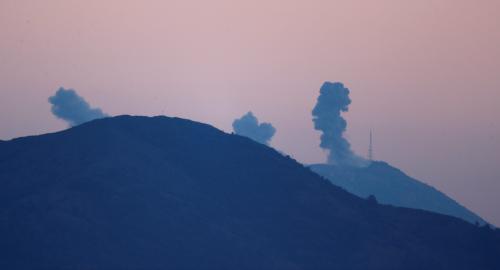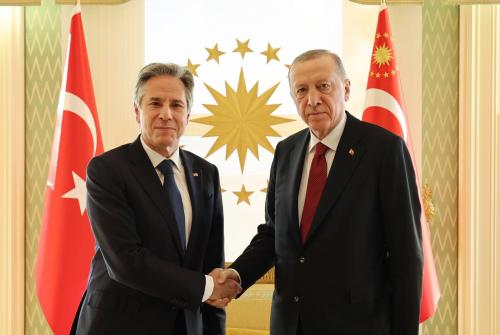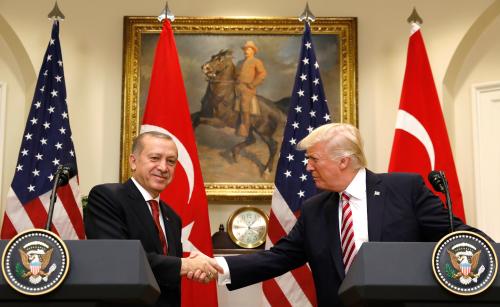Content from the Brookings Doha Center is now archived. In September 2021, after 14 years of impactful partnership, Brookings and the Brookings Doha Center announced that they were ending their affiliation. The Brookings Doha Center is now the Middle East Council on Global Affairs, a separate public policy institution based in Qatar.
Turkey’s decision to conduct a full-scale military incursion into Afrin, Syria—involving airstrikes and ground forces—should not come as a surprise. For the past three years of the campaign to defeat ISIS, the United States has increasingly turned to Syria’s Kurds and their most dominant political and fighting force, the People’s Protection Unit (YPG). But the YPG is the sister organization of Turkey’s Kurdistan Workers Party (PKK), which has fought the Turkish state for more than four decades and has capitalized on the civil war to establish its own, self-governed autonomous region in the northeast of Syria known as Rojava (Syrian Kurdistan).
Turkey fears that an emboldened Syrian Kurdistan and the predominance of the YPG—the armed wing of the Democratic Union Party (PYD), which has gone from strength to strength in recent years—would fuel its own restive Kurdish population and, therefore, strengthen the PKK’s insurgency. Ankara blames Washington’s relationship with the YPG and its policies in Syria for the current crisis, but it is in fact a story of missed opportunities and miscalculations on the parts of Turkey, the YPG, and the United States.
Turkey has developed a habit of pursuing policies in Syria that end up taking the country two steps back. For example, the genesis of the current crisis is not simply rooted in U.S. support for the YPG, despite President Recep Tayip Erdoğan’s claims, but a series of miscalculations during the early stages of the Syrian conflict. At Turkey’s behest, the anti-Assad Syrian opposition, operating out of Turkey, categorically rejected Kurdish autonomy in a post-Assad Syria, even going as far as drafting a constitution that referred to Syria as an Arab republic.
Of course, at the time few expected the conflict to drag on the way it has and expectations were that the Assad regime would also be toppled like his counterparts in the region. However, in doing so, the Arab opposition pushed the Kurdish opposition into tacit cooperation with the Assad regime to guarantee its own survival, despite the regime’s record for systematically repressing Syria’s Kurds. Just months after the opposition refused to make concessions to the Kurds, the Assad regime withdrew its personnel from Kurdish dominated towns and cities in July 2012 to concentrate its efforts on the rebellion, after which the YPG declared autonomy.
While ISIS and other jihadi fighters caught the world’s attention in 2014 in declaring its so-called caliphate, the YPG had been fighting jihadi groups like Jabhat Al-Nusra at least a year earlier, allowing it to consolidate its hold on Kurdish-dominated areas, augment its military capabilities, and acquire the battlefield organization and effectiveness that made it difficult, if not impossible, for the United States to resist aligning with the group when ISIS emerged.
The YPG effectively filled a security void at a critical moment for the United States and the international community, in large part because Turkey and Syria’s ineffective and divided opposition groups continued to prioritize the fall of the Assad regime over the defeat of jihadi groups like ISIS (and for good reason). It would have been difficult to remove the wedge that was initially established between the Turkish backed anti-Assad opposition and the YPG. However, the lack of effort and resources that went into achieving that will be rued in the coming decades, for it could have shifted the momentum decisively against the Assad regime by deploying an effective fighting force, while also converging a multi-ethnic, representative coalition against the regime. That could have additionally mobilized a much stronger, more forceful Western military engagement in the conflict as well as establish an inclusive, representative platform for the reconstruction of the country.
Conversely, the PKK leadership may find that its transnationalism has become its Achilles heel that undermines, if not severely degrades, its autonomous Kurdish region in Syria, the closest it has ever been to not only controlling and governing large swathes of territory but also acquiring de-facto statehood and international recognition. It may regret its failure to attempt to establish a greater political and operational disconnect with its Syrian affiliate.
The YPG could have become a more inclusive actor by sharing power with rival Kurdish groups in Syria, which may have helped assuage Turkish concerns and suppressed nationalist Turkish popular discourse that Rojava was simply a one-party enclave designed to function as a launching pad for attacks in Turkey. More inclusive governance would have also more convincingly positioned the Syrian Democratic Forces (SDF) as a representative, multi-ethnic force as opposed to a form of window dressing for a U.S.-backed, YPG-dominated vehicle aimed at legitimizing the YPG presence and its alliance with the US.
The YPG has gone from strength to strength, has held elections, and even made inroads into territory within northern Iraq. The only major operation Ankara has conducted was last year’s Euphrates Shield operation, which prevented the YPG from combining the three self-governing regions of Rojava—including Afrin, Jazira, and Kobani–into a single autonomous region. By historical standards Turkey has, therefore, actually been something of a passive observer (it is no stranger to cross-border military incursions against the PKK, having done so since the 1980s, particularly in Iraq), one that has at times looked to the United States to constrain Kurdish autonomy in Syria.
What the YPG has failed to appreciate is that with greater size comes greater responsibility. Its expansionism in Syria has come with significant internal discontent and disapproval within the territories it has controlled or administered and, crucially, has added a greater urgency to Turkish but also other regional powers’ determination to contain their influence. In the end, the YPG’s largely uncontested prominence has made it easier, not more difficult, for Erdoğan to mobilize public and regional support for his military incursion into Afrin—which, like other incursions, will play well for domestic audiences ahead of presidential elections either this year or the next.
Aside from Erdoğan’s electioneering, the military incursion comes at a critical moment for Syria’s future and regional geopolitics. Secretary of State Rex Tillerson’s speech last week and the administration’s announcement of its Syria strategy, particularly its announcement of a 30,000-strong border force comprised primarily of YPG fighters, essentially fired the starting pistol for the beginning of the post-ISIS political order in Syria. Ankara’s military incursion was designed, in part, to exert pressure on the YPG. But it also served to claim a stronger stake in the country as the international community moves forward with its efforts to achieve a political settlement and reconstruct the country post-ISIS.
Presence equals power, as Turkey found in Iraqi Kurdistan during the 1990s where it came to terms with de-facto Kurdish statehood. By cooperating with the U.S.-led coalition overseeing the no-fly zone (operating out of Turkey) and by developing stronger relations with the Iraqi Kurds, it became far more capable of influencing events in Iraq as a whole, in addition to acquiring the economic benefits that came with establishing trade ties with the Kurdistan Regional Government (KRG).
That could be repeated again in Syrian Kurdistan, but not until Washington establishes an—admittedly difficult—political strategy that aims to appease Turkish apprehensions as much as it aims to utilize Syrian Kurdistan as an effective, long-term buffer against the resurgence of ISIS and Iran’s expansionism, as per Tillerson’s speech last week. The United States does not have a presence in Afrin and West of the Euphrates river more generally, but U.S. proclamations that it will attempt to police the cross-border interactions between the PKK and YPG, as a minimum, could have gone a long way toward easing Turkish concerns, even if such reassurances carried symbolic weight and may not even be practically feasible, for now.
Abandoning the YPG completely and withdrawing from Syria is not plausible, not when the United States has limited options on the ground, which will be particularly important for the stabilization and reconstruction of the country and not when the regional security architecture is in flux. That would be reckless and irresponsible. Further, a PKK and YPG separation is implausible at this stage. Even if the two groups were to splinter somehow, that would not register among Turkish policymakers, as it misses the crux of the problem from their perspective: Kurdish secessionism and state-building that is driven and dominated by the PKK, its affiliate groups and cadres, no matter their shape or form.
Containing the crisis (and the YPG) is possible though, at least until Turkey and the PKK revisit the 2014 peace process that could still be revitalized and provide a lasting solution. The United States can prevent Syrian Kurdistan from becoming a one-party, YPG dominated statelet, and that requires a greater embrace of good governance and institution-building in order for it to deploy a proactive, forceful strategy that oversees Syrian Kurdistan’s political development and ensures the YPG does not monopolize and appropriate local institutions, the economy, and reconstruction aid.
Politics and security overlap. Turkey, for its part, must realize that its incursions not only further radicalize its Kurdish population and the PKK’s support bases, but also risks unifying otherwise divided Kurdish groups in Syria. Turkey’s incursion may end up positioning the PKK as the champion of Kurdish nationalism in the region, to the detriment of other Kurdish groups in the region that Turkey and the West have historically partnered with, particularly in Iraqi Kurdistan. Moving forward, the United States must aim to repeat history by establishing a political strategy for Syria’s Kurds in much the same way it did with Iraq’s Kurds, lest that political vacuum is filled by its rivals.








Commentary
What’s next for Turkey, the US, and the YPG after the Afrin operation?
January 26, 2018